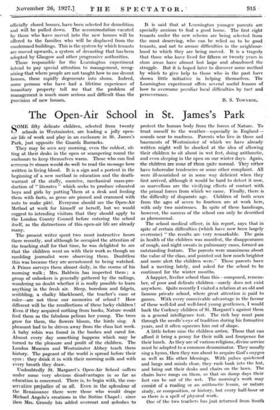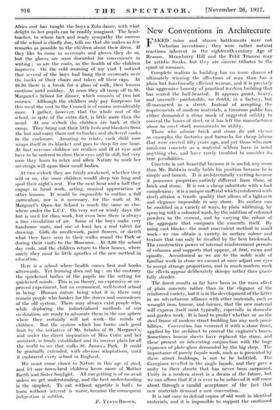The Open-Air School
in St. James's Park
SOME fifty delicate children, selected from twenty schools in Westminster, are leading a jolly open- air life of work and play in an enclosure in St. James's Park, just opposite the Guards Barracks.
They may be seen any morning, even the coldest, sit- ting at their desks in the open or scampering round the enclosure to keep themselves warm. Those who can find rnrte!IS in stones -would-do-well -to read the message here written in living blood. It is a sign and a portent in the beginning of a new method in education and the death- warrant of the stuffy, coercive, mechanical mass-pro- duction of " literates " which seeks to produce educated boys and girls by putting 'them at a desk and feeding them with facts, as geese are pinned and crammed with nuts to make pâté. Everyone should see the Open-Air Method at work for himself or herself, but we would suggest to intending visitors that they should apply to the London County Council before entering the school itself, as the distractions of this open-air life are already many.
The present writer spent two most instructive hours there recently, and although he occupied the attention of the teaching staff for that time, he was delighted to see that the children went on with their work as though no rambling journalist were observing them. Doubtless this was because they are accustomed to being watched. A Prince surveys them almost daily, in the course of his morning walk ; Mrs. Baldwin has inspected them ; a group of onlookers is generally gathered by the railings, wondering no doubt whether it is really possible to learn anything in the fresh air. Sleep, boredom and fidgets, scribbling, a chalky blackboard, the teacher's cane or ruler—are not these our memories of school ? How different will be the recollections of these lucky children ! Even if they acquired nothing from books, Nature would feed them as the fabulous pelican her young. The trees grow for them, the flowers bloom, the birds sing. A pheasant had to be driven away from the class last week. A baby robin was found in the bushes and cared for. Almost every day something happens which may be turned to the -pleasure and profit of the children. The London Muselm and Westminster Abbey teach them history. The pageant of the world is spread before their eyes : they drink it in with their morning milk and with every breath they draw.
Undoubtedly St. Margaret's Open-Air School suffers under some very obvious disadvantages in so far as education is concerned. There is, to begin with, the con- servative prejudice of us all. Even in the splendour of the Renaissance there were those who would drape Michael Angelo's creations in the Sistine Chapel : since then Mrs: Grundy Ms added overcoat and goloshes to protect the human body from the forces of Nature. To trust oneself to the weather—especially in England— sounds near to madness. Parents who live in those sad basements of Westminster of which we have already written might well be shocked at the idea of allowing their children to sit about in wet feet, doing arithmetic, and even sleeping in the open on our winter days. Again, the children are none of them quite normal. They either have tubercular tendencies or some other complaint. All were ill-nourished or in some way deficient when they first arrived, although it would be hard to detect it now, , so marvellous are the vivifying effects of contact with., the primal forces from which we came. Finally, there is . the difficulty of disparate age. Children of both sexes from the ages of seven to fourteen are at work here, with only two mistresses. In spite of these handicaps, however, the success of the school can only be described as phenomenal.
The school medical officer, in his report, says that in spite of certain difficulties (which have now been largely. overcome) " the results are very remarkable. The gain in health of the children was manifest, the disappearance of cough, and night sweats in pulmonary cases, formed an outstanding feature. The parents were unanimous about the value of the class, and pointed out how much brighter and more alert.the children were." These parents have had a meeting lately, and asked for the school to be continued for the winter months.
A happier, livelier school than this—composed, remem- ber, of poor and delicate children—surely does not exist anywhere. Quite recently I visited a relation at an old and famous private school, where great attention is paid to games. With every conceivable advantage in the favour of these well-fed and well-bred young gentlemen, I would back the Cockney children of St. Margaret's against them in a general intelligence test. The rich boy must pass through the needle's-eye of tradition during his formative years, and it often squeezes him out of shape.
A little before nine the children arrive. Those that can afford it bring a penny for their milk and fourpence for their lunch. As they arc of various religions, divine service must be adapted to a common denominator. They usually sing a hymn, then they run about to acquire God's oxygen as well as His other blessings. With pulses quickened and lungs and minds clear, they rush' back into the hut, and bring out their desks and chairs on the • lawn. The chairs have rungs on them, so that on damp days their feet can be out of the wet. The morning's work may consist of a reading or an arithmetic lesson, or nature study, or composition, or history, but every half-hour or so there is a spell of physical work..
One of the two teachers has just returned from South Africa and has taught the boys a Zulu dance, with what delight to her pupils can be readily imagined. The head- teacher, to whose tact and ready sympathy the success of the school is chiefly due, tells me that she makes as few remarks as possible to the children about their dress. If they like to come in overcoats and gloves they do so, but the gloves are soon discarded for convenience in writing ; so are the coats, as the health of the children improves. On the cold morning of my visit I noticed that several of the boys had hung their overcoats over the backs of their chairs and taken off their caps. . At 10.30 there is a break for a glass of milk, then lessons continue until midday. At noon they all troop off to St. Margaret's School for dinner, which consists. of two hot courses. Although. the children only pay fourpence for this meal the cost to the Council is of course considerably more. I gather, however, that the whole cost of the school, in spite of the extra diet, is little more than the usual. At one o'clock the children are back at their camp. They bring out their little beds and blankets from the "hut and carry them out to bushes and sheltered nooks in the enclosure. Amazing to relate, each child now wraps itself in its blanket and goes to sleep for one hour. At first nervous children are restless and ill at ease and have to be ordered to close their eyes and lie still, but very soon they learn to relax and allow Nature to work her sovereign will upon their small bodies.
- At two o'clock they are firmly awakened, whether they will or no, else some children would sleep too long and spoil their night's rest. For the next hour and a half they engage in hand work, acting, musical appreciation or other lessons. It would be impossible to outline a full curriculum, nor is it necessary, for the work at St. Margaret's Open-Air School is much the same as else- where under the L.C.C. On very wet or windy days the but is used for- class work, but even here there is always a free circulation of air. Some of the boys make very handsome mats, - and one at least has a real talent for drawing. Girls do needlework, paint flowers, or sketch what they have seen in their walks round the Park or during their visits to the Museums. At 3.30 the school day ends, and the children return to their homes, where surely they must be little apostles of the new method in education. - Here is a school where health comes first and books afterwards. Yet learning does not lag : on the contrary the quickened bodies of the pupils are the setting for quickened minds. This is no theory, no expensive or un- proved experiment, but an economical, well-tested school in being. Human nature being what it is, there may remain people who hanker for the stoves and somnolence of the old system. There may always exist people who, while deploring the industrialized Methods of our civilization, are ready to advocate them in the one sphere where they certainly will not work—the minds." of Children. But the system which has borne such good fruit by the initiative of Mr. Seholes of St. Margaret's; and under the direct inspiration of Miss Corin and her assistant, is firmly established and its success plain for all the world to see that walks St. James's Park. It could be gradually extended, with obvious adaptations, until it embraced every school in England.
We must come closer to Nature in this age of steel,. and let our town-bred children know more of Mother Earth and Sister Sunlight. MI our getting is of no avail unless we get understanding, and the best understanding is the simplest. To eat without appetite is bad : to learn without interest is worse, because the consequent indigestion is subtler., F. YEATS-BROWN.























































 Previous page
Previous page